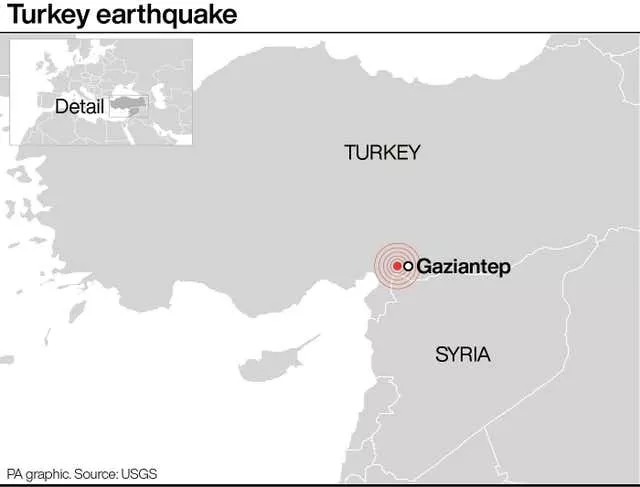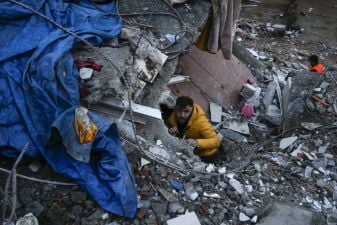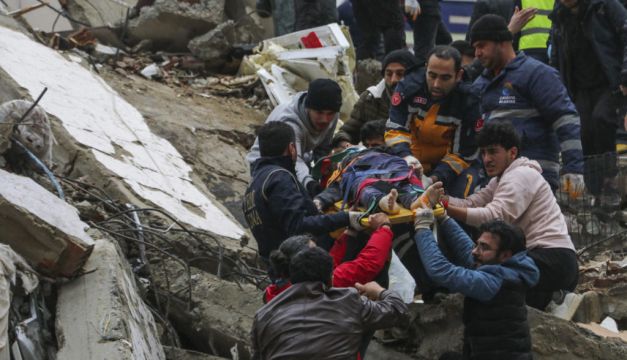More than 2,800 people have died after a powerful 7.8-magnitude earthquake toppled hundreds of buildings across wide swathes of Turkey and Syria.
Hundreds of people are still believed to be trapped under rubble, and the death toll is expected to rise as rescue workers search mounds of wreckage in cities and towns across the area.
Turkish president Recep Tayyip Erdogan declared seven days of national mourning.
Authorities feared the death toll would keep climbing as rescuers searched through tangles of metal and concrete for survivors in a region beset by more than a decade of Syria’s civil war and a refugee crisis.
On both sides of the border, residents jolted out of sleep by the pre-dawn quake rushed outside on a cold winter’s night.

Nearly 1,500 people were killed in 10 Turkish provinces, with some 8,500 injured, according to the president of the country’s disaster management agency.
The death toll in government-held areas of Syria climbed past 430 people, with some 1,280 injured, according to the health ministry.
In the country’s rebel-held north-west, groups that operate there said the death toll was at least 380, with many hundreds more injured.
Buildings were reduced to piles of pancaked floors, and major aftershocks or new quakes, including one nearly as strong as the first, continued to rattle the region.
Rescue workers and residents in multiple cities searched for survivors, working through tangles of metal and concrete. A hospital in Turkey also collapsed, and patients, including newborn babies, were evacuated from facilities in Syria.
I am deeply saddened by the loss of life and devastation caused by the earthquake in Turkiye and Syria. I have directed my team to continue to closely monitor the situation in coordination with Turkiye and provide any and all needed assistance.
Advertisement— President Biden (@POTUS) February 6, 2023
Turkish President Recep Tayyip Erdogan said: “Because the debris removal efforts are continuing in many buildings in the earthquake zone, we do not know how high the number of dead and injured will rise.
“Hopefully, we will leave these disastrous days behind us in unity and solidarity as a country and a nation.”
The quake, which was centred on Turkey’s south-eastern province of Kahramanmaras, was felt as far away as Cairo. It sent residents of Damascus rushing into the street, and jolted awake people in their beds in Beirut.

In the Turkish city of Adana, one resident said three buildings near his home were toppled.
The tremor struck a region that has been shaped on both sides of the border by more than a decade of civil war in Syria.
On the Syrian side, the region affected is divided between government-held territory and the country’s last opposition-held enclave, which is surrounded by Russian-backed government forces. Turkey, meanwhile, is home to millions of refugees from that conflict.
The opposition-held regions in Syria are packed with some four million people displaced from other parts of the country by the fighting. Many of them live in buildings that are already wrecked from past bombardments. Hundreds of families remained trapped in rubble, according to the opposition emergency organisation, the White Helmets.
Ireland will provide €2 million in emergency assistance to the people of Türkiye and Syria following the devastating earthquakes which struck the region this morning.
Full details here: 📄https://t.co/hwGmYjzviW— Micheál Martin (@MichealMartinTD) February 6, 2023
Strained health facilities and hospitals were quickly filled with injured, rescue workers said. Others had to be emptied, including a maternity hospital, according to the SAMS medical organisation.
The region sits on top of major fault lines and is frequently shaken by earthquakes. Some 18,000 people were killed in a similarly powerful earthquakes that hit north-west Turkey in 1999.
The US Geological Survey measured Monday’s quake at 7.8. Hours later, a 7.5 magnitude one struck more than 60 miles away. An official from Turkey’s disaster management agency said it was a new earthquake, not an aftershock, though its effects were not immediately clear. Hundreds of aftershocks were expected after the two tremors, the official told reporters.

Thousands of buildings were reported collapsed in a wide area extending from Syria’s cities of Aleppo and Hama to Turkey’s Diyarbakir, more than 200 miles to the north-east. A hospital collapsed in the Mediterranean coastal city of Iskenderun, but casualties were not immediately known, Turkish vice president Fuat Oktay said.
Televisions stations in Turkey aired screens split into four or five, showing live coverage from rescue efforts in the worst-hit provinces. In the city of Kahramanmaras, rescuers pulled two children alive from the rubble, and one could be seen lying on a stretcher on the snowy ground.
Offers of help – from search-and-rescue teams to medical supplies and money – poured in from dozens of countries, as well as the European Union and Nato.

In Turkey, people trying to leave the quake-stricken regions caused traffic jams, hampering efforts of emergency teams trying to reach the affected areas. Authorities urged residents not to take to the roads. Mosques around the region were opened to provide shelter for people unable to return to damaged homes amid temperatures that hovered around freezing.
In Diyarbakir, hundreds of rescue workers and civilians formed lines across a mountain of wreckage, passing down broken concrete pieces, household belongings and other debris as they searched for trapped survivors while diggers sifted through the rubble below.
The quake damaged a historic castle perched on top of a hill in the centre of the provincial capital of Gaziantep, about 20 miles from the epicentre. Parts of the fortresses’ walls and watch towers were levelled and other parts heavily damaged, images from the city showed.
Meanwhile, the directorate-general of Antiquities and Museums in Syria said the earthquake has caused some damage to the Crusader-built Marqab, or Watchtower Castle, on a hill overlooking the Mediterranean. Parts of a tower and some walls collapsed.
In the small Syrian rebel-held town of Azmarin in the mountains by the Turkish border, the bodies of several dead children, wrapped in blankets, were seen being brought to a hospital.

In north-west Syria, the quake added new woes to the opposition-held enclave centred on the province of Idlib, which has been under siege for years, with frequent Russian and government air strikes. The territory depends on a flow of aid from nearby Turkey for everything from food to medical supplies.
The opposition’s Syrian Civil Defence described the situation there as “disastrous”.
The USGS said the quake was 11 miles deep.







